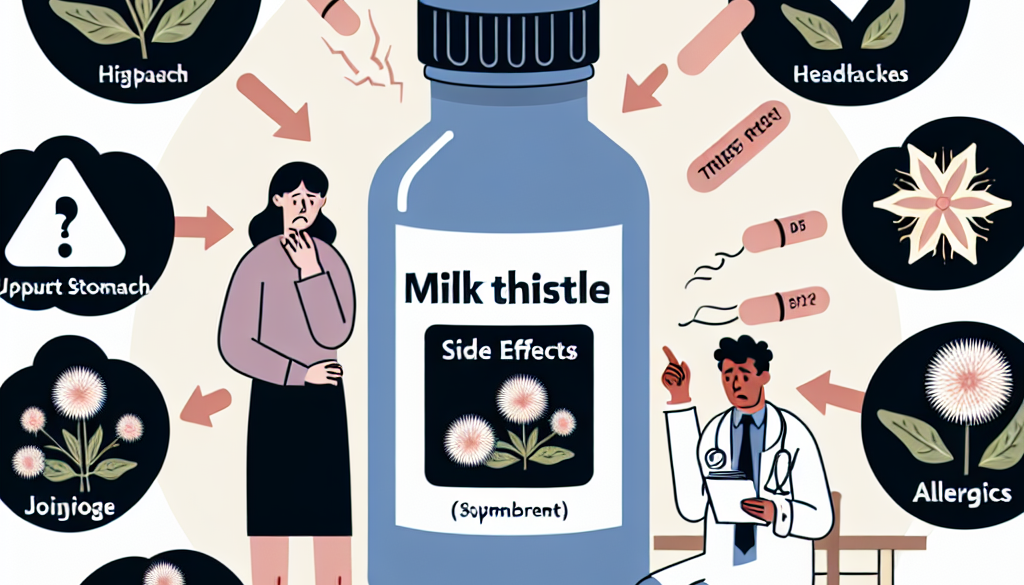Is there a downside to taking milk thistle?
-
Table of Contents
- Milk Thistle: Exploring the Potential Downsides of This Popular Supplement
- Understanding Milk Thistle and Its Uses
- Potential Side Effects of Milk Thistle
- Research Findings on Milk Thistle’s Adverse Effects
- Case Studies and Statistics on Milk Thistle’s Side Effects
- Who Should Avoid Milk Thistle?
- Conclusion: Balancing the Benefits and Risks of Milk Thistle
- Discover ETchem’s Protein Products
Milk Thistle: Exploring the Potential Downsides of This Popular Supplement

Milk thistle, a natural herb that has been used for centuries as a remedy for various ailments, particularly liver problems, has gained significant popularity in the health and wellness community. Known for its active ingredient, silymarin, milk thistle is often touted for its antioxidant and anti-inflammatory properties. However, as with any supplement, it is crucial to consider the potential downsides and weigh them against the benefits. This article delves into the possible adverse effects of taking milk thistle, supported by research, case studies, and statistics.
Understanding Milk Thistle and Its Uses
Milk thistle (Silybum marianum) is a plant native to Mediterranean countries. It has been used in traditional medicine for over 2,000 years, primarily for treating liver and gallbladder disorders. The seeds contain silymarin, a group of compounds said to have antioxidant and anti-inflammatory effects, which is why milk thistle is often recommended for liver health.
Potential Side Effects of Milk Thistle
While milk thistle is generally considered safe for most people, there are some potential side effects to be aware of:
- Gastrointestinal Issues: Some individuals may experience diarrhea, nausea, bloating, and other digestive problems.
- Allergic Reactions: Those allergic to the Asteraceae/Compositae family of plants, which includes ragweed, chrysanthemums, marigolds, and daisies, may also be allergic to milk thistle.
- Interactions with Medications: Milk thistle can interact with certain medications, including but not limited to, diabetes drugs, blood thinners, and some cancer treatments.
- Endocrine Effects: There is some evidence that milk thistle may mimic the effects of estrogen, which could be problematic for individuals with hormone-sensitive conditions.
Research Findings on Milk Thistle’s Adverse Effects
Several studies have investigated the safety profile of milk thistle. While many have found it to be well-tolerated, some research highlights potential concerns:
- A study published in the Journal of Herbal Pharmacotherapy reported that high doses of milk thistle could lead to an increased risk of gastrointestinal disturbances.
- Case reports have documented instances of allergic reactions to milk thistle, including a case of anaphylaxis.
- Research in the World Journal of Hepatology suggests that milk thistle may have estrogenic effects, which could be detrimental to individuals with certain cancers or other hormone-related issues.
Case Studies and Statistics on Milk Thistle’s Side Effects
While case studies and statistics on the side effects of milk thistle are relatively limited, they provide valuable insights into its safety:
- A case study in the Annals of Hepatology reported liver damage in a patient who consumed milk thistle supplements, although this is rare and more research is needed to establish a direct link.
- Statistics from poison control centers indicate that adverse reactions to milk thistle are infrequent, with few cases reported annually.
Who Should Avoid Milk Thistle?
Given the potential downsides, certain individuals should exercise caution or avoid milk thistle altogether:
- People with allergies to plants in the Asteraceae/Compositae family.
- Individuals taking medications that could interact with milk thistle.
- Those with hormone-sensitive conditions, such as breast, uterine, or ovarian cancer, endometriosis, or uterine fibroids.
- Pregnant or breastfeeding women, due to the lack of sufficient safety data.
Conclusion: Balancing the Benefits and Risks of Milk Thistle
In conclusion, while milk thistle is a natural supplement with a long history of use for liver health, it is not without its potential downsides. Side effects, though generally mild, can include gastrointestinal issues and allergic reactions. Interactions with medications and possible hormonal effects are also concerns that warrant caution. As with any supplement, it is essential to consult with a healthcare provider before starting milk thistle, especially for those with pre-existing conditions or those taking other medications.
Discover ETchem’s Protein Products
If you’re looking for high-quality protein supplements to complement your health regimen, consider ETchem’s range of protein products. ETchem, a reputable Chinese Collagen factory manufacturer and supplier, offers a variety of collagens, including marine, fish, bovine, chicken, and types I, II, and III. Their products are known for their neutral taste and instant solubility, making them a great addition to any diet. Catering to industries such as nutraceuticals, pharmaceuticals, cosmeceuticals, and food and beverage, ETchem ensures comprehensive solutions for all your protein needs. For more information or to sample their products, please contact them at karen(at)et-chem.com today.
About ETChem:
ETChem, a reputable Chinese Collagen factory manufacturer and supplier, is renowned for producing, stocking, exporting, and delivering the highest quality collagens. They include marine collagen, fish collagen, bovine collagen, chicken collagen, type I collagen, type II collagen and type III collagen etc. Their offerings, characterized by a neutral taste, instant solubility attributes, cater to a diverse range of industries. They serve nutraceutical, pharmaceutical, cosmeceutical, veterinary, as well as food and beverage finished product distributors, traders, and manufacturers across Europe, USA, Canada, Australia, Thailand, Japan, Korea, Brazil, and Chile, among others.
ETChem specialization includes exporting and delivering tailor-made collagen powder and finished collagen nutritional supplements. Their extensive product range covers sectors like Food and Beverage, Sports Nutrition, Weight Management, Dietary Supplements, Health and Wellness Products, ensuring comprehensive solutions to meet all your protein needs.
As a trusted company by leading global food and beverage brands and Fortune 500 companies, ETChem reinforces China’s reputation in the global arena. For more information or to sample their products, please contact them and email karen(at)et-chem.com today.




